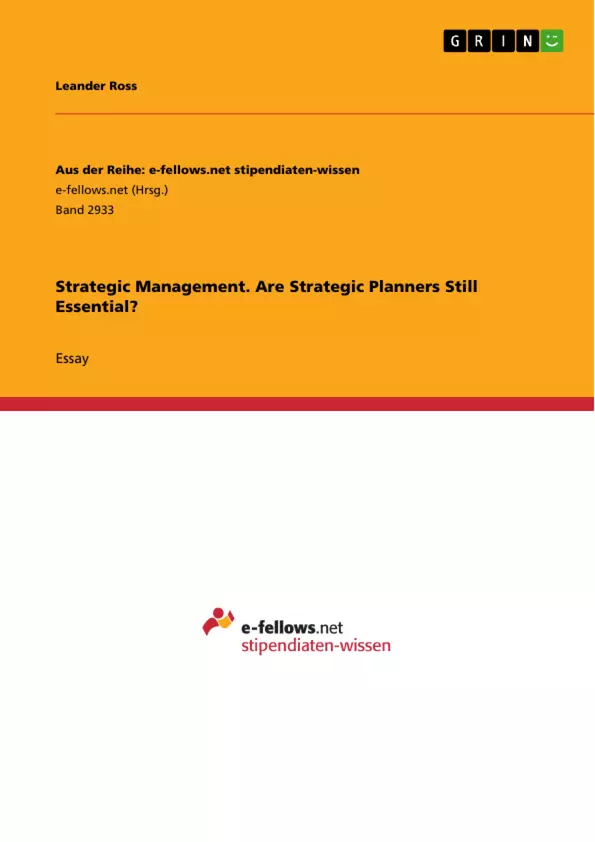Rising turbulence in the economic environment of organisations in a globalised world enhances the discussion of whether strategic planners should be involved in the strategic decision-making process of organisations. This essay outlines the importance of strategic planners all the more in times of great uncertainty, although there is a number of advantages and disadvantages. In terms of advantages, for example, it helps the management of an organisation by finding emergent strategies, by fostering creativity and by providing a coordination and communication tool. However, in terms of disadvantages, it can stifle flexibility and creativity, and it is questioned whether planning can actually be undertaken when the future is uncertain. Firstly, this essay defines a number of key terms, then critically discusses the advantages and disadvantages of involving strategic planners in strategic decisions in an uncertain environment, before it finally draws the main challenges and benefits together in a conclusion.
Inhaltsverzeichnis (Table of Contents)
- Introduction
- Defining Strategy and Strategic Decisions, Uncertain Environment and Strategic Planners
- Strategy and Strategic Decisions
- An Uncertain Environment
- The Role of Strategic Planners
- Discussion: Advantages and Disadvantages of the Involvement of Strategic Planners
- Conclusion
Zielsetzung und Themenschwerpunkte (Objectives and Key Themes)
This essay examines the advantages and disadvantages of involving strategic planners in the decision-making process of organizations, particularly in a turbulent and unpredictable economic environment. It explores the role of strategic planners in finding emergent strategies, fostering creativity, and providing coordination and communication tools. The essay also considers the potential drawbacks, such as stifling flexibility, hindering creativity, and the question of whether planning is effective in uncertain environments.
- The role of strategic planners in organizational decision-making
- The impact of an uncertain economic environment on strategic planning
- Advantages and disadvantages of involving strategic planners
- The deliberate vs. emergent views of strategy development
- The importance of balancing deliberate and emergent approaches to strategy.
Zusammenfassung der Kapitel (Chapter Summaries)
- Introduction: This chapter introduces the topic of strategic planning in a volatile economic environment and outlines the essay's structure, highlighting the importance of strategic planners in uncertain times.
- Defining Strategy and Strategic Decisions, Uncertain Environment and Strategic Planners: This section defines key terms such as strategy, strategic decisions, and uncertain environment. It explores different approaches to strategy development, including deliberate and emergent strategies, and the importance of strategic fit between organizational strategies and their environment. It also discusses the challenges of strategic decision-making in the context of multiple stakeholders and risk.
- Discussion: Advantages and Disadvantages of the Involvement of Strategic Planners: This chapter critically analyzes the advantages and disadvantages of incorporating strategic planners in strategic decisions. It highlights the benefits of having a clear strategic direction, as well as the potential drawbacks of rigid planning and the inherent conflict between deliberate and emergent strategy approaches.
Schlüsselwörter (Keywords)
This essay focuses on the key concepts of strategic planning, uncertain environment, strategic decision-making, deliberate vs. emergent strategy, advantages and disadvantages of involving strategic planners, organizational learning, and the interplay between formal planning and creativity.
Frequently Asked Questions
Are strategic planners still necessary in today's economy?
Yes, the essay argues that strategic planners are essential, especially in times of high uncertainty and economic turbulence, to provide direction and coordination.
What is the difference between deliberate and emergent strategy?
Deliberate strategy is planned and intentional, while emergent strategy develops over time as an organization learns and adapts to its environment.
What are the advantages of involving strategic planners?
They help foster creativity, provide communication tools, and assist management in identifying emergent strategies within a complex environment.
Can strategic planning stifle creativity?
Yes, one disadvantage discussed is that rigid planning processes can potentially hinder flexibility and creative thinking if not balanced correctly.
How does an uncertain environment affect strategic decisions?
Uncertainty makes traditional long-term planning difficult, requiring a strategic fit that balances formal planning with the ability to react to unforeseen changes.
- Citar trabajo
- Leander Ross (Autor), 2018, Strategic Management. Are Strategic Planners Still Essential?, Múnich, GRIN Verlag, https://www.grin.com/document/451165



